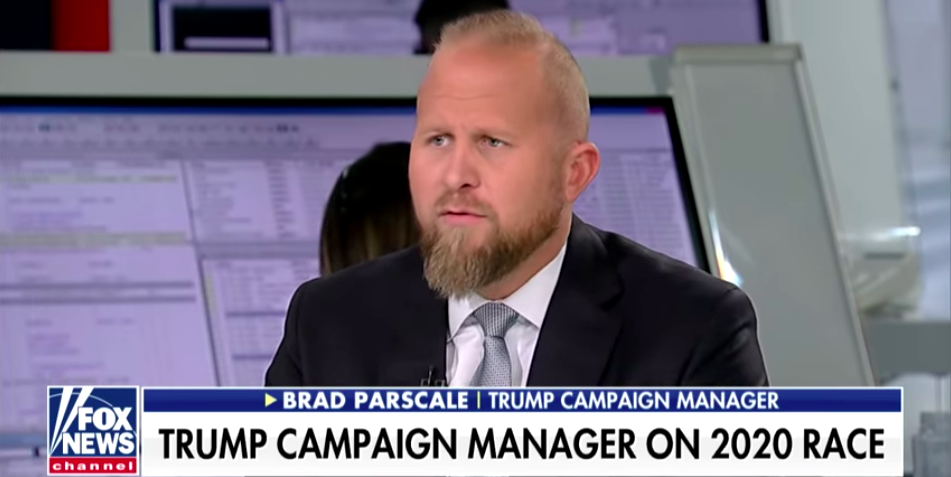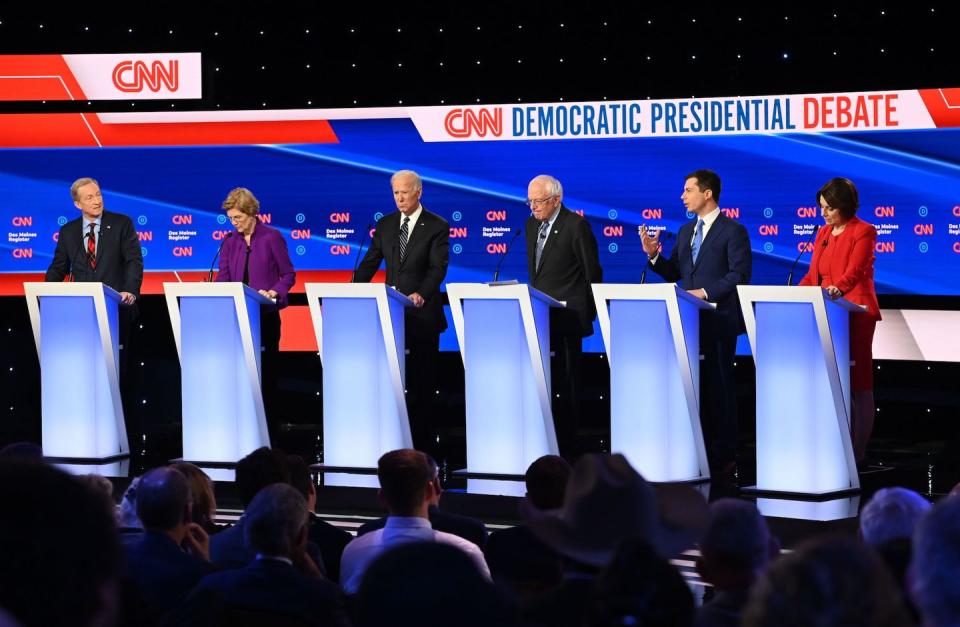Trump's Campaign Manager Just Signaled the 2020 Strategy: Head for the Gutter

As Hillary Clinton wades into the 2020 Democratic presidential race and encourages us to do 2016 all over again, let's check in on the campaign that beat her that year. One of the defining features of the general election last time around was that both major-party candidates, Clinton and Donald Trump, were historically unpopular.
(Now we must insert that some of the criticism of Clinton was merited, some of it was tied to misogyny, some of it was the work of dubious social-media activity, some of it was a product of her primary clash with Bernie Sanders, and much of it stuck because the public had been primed for decades to believe stories suggesting the Clintons are corrupt and self-serving. Also, much of it was bad-faith: no one actually cares about email protocol—the number-one story about Clinton in 2016 that got as much front-page coverage in a six-day period as policy issues did in 69—which we know for sure because a bunch of senior officials in Trump's administration have used private email for official business and no one has really cared.)
In the time since he's been president, Donald Trump's job approval among a core constituency, (white) suburban voters, has plummeted. That's especially true of suburban women, who now view him negatively by a 24-point margin. Bill Hemmer brought this up in—credit where it's due—a Fox News interview with Brad Parscale, after Trump's campaign chief unleashed a thoroughly Trumpian monologue about how tremendous he's doing.
After claiming the President is up in all the metrics, Brad Parscale is confronted with numbers in a Fox News poll on suburban women. pic.twitter.com/KWTucJqK0k
— Acyn Torabi (@Acyn) January 20, 2020
Parscale was mostly trying to spin out of admitting any Trump weakness here—the worst thing you could ever associate with The Boss while you're speaking on the teevee, where he might actually listen to you. But Parscale also made a key distinction, and he's not wrong:
Well, those are different measurements, also. You're measuring one on a ballot, and one on approval. Those are different things. The president's actually never done better on all his numbers when you start looking at ballots. You gotta remember, we still don't have a candidate to run against.
Then there were a bunch of (almost certainly false) claims about how well Trump is doing in their internal approval polls—which, conveniently, no one will ever see. Parscale also overstated how well Trump is doing in head-to-heads against the Democratic candidates, and it's hard to know how much head-to-head polls are worth when the candidates haven't actually gone head-to-head yet with the entire public's attention. Right now, that attention is fragmented around the primary, impeachment, Iran, Trump's daily outbursts and corruptions, and more than anything else, people's actual daily lives.
Also, a vital part of the process has not yet begun. No matter who the Democratic nominee is, Trump will attempt to paint them as just as much of a corrupt liar as he is so that the choice is between two crooked operators. It's hard to see how he can eke out victory against an opponent who's even vaguely popular. The president will claim credit for the strong economy—and a downturn before November could be fatal for his campaign—but it's unlikely he will see that as enough. Trump will believe he has to drag whoever emerges from the primary down into the gutter until they smell like he does—and enough people decide to just hold their nose and vote for the Good Economy Guy. He will have the help of conservative media, his allies in the Republican Party, various online operators from abroad, and whoever in the mainstream media is scared enough of criticism from all those quarters to equate whatever scandal is attached to the Democrat to Trump's titanic, indigestible mass of scandals and controversies.

In 2016, The Emails and The Foundation—the second of which presented real conflict-of-interest concerns—were presented as roughly equivalent to the aggregate of Trump's public racism, the many accusations of sexual assault and harassment against him, bragging about assault on tape, ripping off contractors who performed work for him, employing undocumented immigrants while demonizing them for political gain, abuse of his charity, his fake university, the conflicts-of-interest presented by his sprawling foreign business, and his blatant unfamiliarity with the details of pretty much any policy issue. This played a role in the result, just like Clinton's poorly run campaign did.
The reason Trump, whom only 40-to-43 percent of the country likes at any given time, had a chance was that his opponent was also tarnished. Why not give me a shot, Trump sometimes said explicitly, I can't be worse than what you've already tried. Even if it did not convert voters from Clinton to Trump, it may well have suppressed weakly committed Clinton voters—particularly in crucial cities in the industrial midwest—and convinced them it wasn't worth going out to vote for her.
The question is whether any other candidate could be so decisively tarnished as Clinton was, or whether the decades of relentless scrutiny made it a unique situation. Certainly, Trump has tried to recreate aspects of The Emails and The Foundation with his attempted Ukrainian ratfucking of Joe Biden. There are real questions about why Biden's son, Hunter, got a plush board seat from a Ukrainian oligarch, even if there's no evidence Biden the Elder did anything untoward. In fact, he was among the calls to fire a prosecutor regarded by the entire West as corrupt, and whose departure may have made an investigation of Burisma more likely. But none of these details will matter once the right-wing machine gets going, and if The New York Times starts writing about the shadows emerging around Biden's campaign because of it.

Or maybe Biden can win if he would just campaign in Wisconsin. Maybe any of the Democrats can. Or maybe some candidates will prove more impervious to ratfucking than others. Would Bernie Sanders's relentless focus on his stuff prevent him from getting into the mudslinging Trump thrives on? Would Elizabeth Warren be able to paint Trump as singularly corrupt and irredeemable, or would Trump's weaponization of a Native slur actually work? Would Pete Buttigieg harness his youth to defuse accusations of careerist politicking and entrenched power, or would he lose his cool—see: that New York Times moment—the first time Trump said something genuinely out of line? And can any of them appeal to the left while holding 2018's suburban gains?
The questions are worth asking now, because 2020 is destined to be among the dirtiest elections in this country's history. Donald Trump, who faces genuine legal jeopardy if he loses the stay of prosecution offered by the presidency, will stop at nothing to keep a grip on power. Running for president while running a shady business operation was the greatest act of impulse in a long life full of them, and now he will have to weather the consequences any way he can. The way that worked once before was to batter Americans' belief in the democratic republic as it stands. Everyone's crooked, so what's the difference?
You Might Also Like

